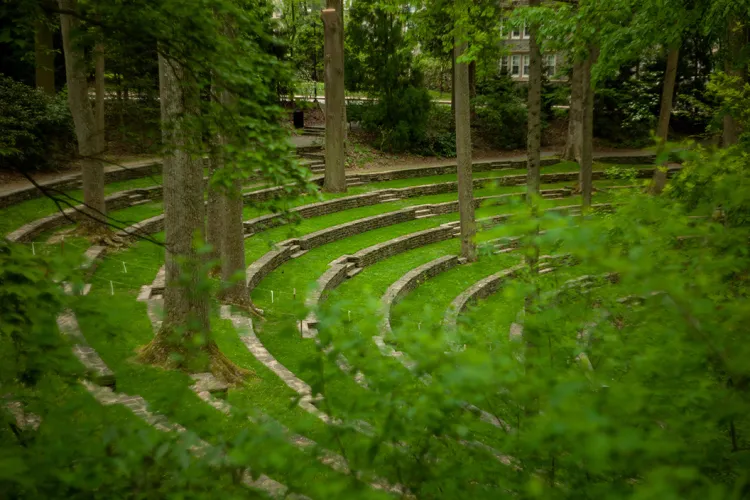An Update on Student Social Events and Community Standards from President Smith

President Valerie Smith shared this message with the campus community on Friday, May 10.
I write today to share the report from the Task Force for Student Social Events and Community Standards [PDF] and my decisions regarding their recommendations on issues related to social life at Swarthmore. I want to express my gratitude to all of the Task Force members for their rigorous and thoughtful work throughout the past year.
After carefully considering their findings and hearing the viewpoints and experiences of many members of our community throughout this academic year, I have decided to move forward as follows:
Greek Letter Organizations
Fraternities and sororities will no longer exist at the College. The Swarthmore chapter of Kappa Alpha Theta sorority may continue with its current members through the spring 2022 semester but may no longer recruit or initiate additional members.
The voluntary disbanding of Phi Psi and Delta Upsilon reflects a broader change in student needs and desires. Exclusive, dues-paying social organizations no longer effectively meet the needs of our residential liberal arts environment.
Fraternity House Leases
In keeping with the Task Force’s recommendation, the College is ending the practice of leasing space to student groups. Delta Upsilon did not have a lease this academic year. A lease termination agreement between the College and the Phi Psi Alumni Association, dated May 1, 2019, ends the last lease of this kind.
Long-term plans for the use of the two former fraternity houses, which are now closed, are still to be decided. We will begin this summer to determine how those spaces might integrate with the plans for a re-imagined Sharples. We will then work with students and other community stakeholders to identify how we can best support students’ needs, including the future of those buildings.
Student Social Life
The Task Force’s report highlights the impact of alcohol use on the safety and wellbeing of students. The report also notes the importance of both increased education about safe drinking practices and the need for additional alcohol-free social events and spaces.
Starting this summer and continuing into the fall, the Dean’s Office will build on past efforts and work with a broad cross-section of students to review and improve the policies governing student social events. Insofar as a robust and diverse social life is a crucial element of the Swarthmore experience, we want to eliminate obstacles and streamline the process through which social events are approved to make it easier for students to host social events.
Title IX
I recognize that recent campus events and conversations have deeply affected many members of our community, especially survivors of sexual assault.
While the report did not specifically address Title IX policies and practices, the Task Force worked in close collaboration with the Title IX Office, Public Safety, and the Dean’s Office in recognition that strong and clear policies on sexual misconduct are essential to a safe and healthy campus social life.
The Title IX Office will continue to evaluate and evolve its policies through an annual review process. The office will also continue to build strong relationships with campus affinity groups through regular outreach and targeted programming. Bindu Jayne, Title IX coordinator, will lead this effort.
Mental Health and Wellness Resources
This academic year, my office funded a clinical community liaison in CAPS who serves as a bridge between the confidential clinical services provided by CAPS and underrepresented, marginalized, and otherwise vulnerable student populations in order to minimize barriers to support. I will support this position through the 2019-20 year as well. David Ramirez will continue to assess the needs and efficacy of that position to help determine if it should be made permanent.
Public Safety
I support the need for Public Safety to continue to pursue the recommendations identified in the department’s recent external review, including those pertaining to community engagement and department operations.
Next Steps
To encourage our ongoing collective reflection, I have asked Dean Jim Terhune and Provost Sarah Willie-LeBreton to oversee a series of group conversations in the fall among students, staff, and faculty to discuss the relationship between our academic and co-curricular roles and programming. We are at a critical moment, especially as we envision new social gathering spaces as part of the Sharples Dining and Community Commons project.
The struggles we have faced offer an opportunity for self-reflection and growth, for movement towards, rather than away from each other. I remind everyone that the upcoming community forum on Mon., May 13 from 3–4 p.m. in Bond Hall will allow us to gather to discuss the report and the next steps I have outlined here.
Our Community
I recognize that serious fissures in our community remain open, and I am sorry that this has been such a challenging time.
As we move forward, I call for each of us to examine how we live up to the aspiration of inclusivity. We must try to do so together, without giving up on one another and without giving up on our community. Practice the art of deep listening. Do not accept division. Remain in difficult conversations, especially with those with whom we disagree. This work will not be easy, but we will all be the better for it.
Sincerely,
Valerie Smith
President



